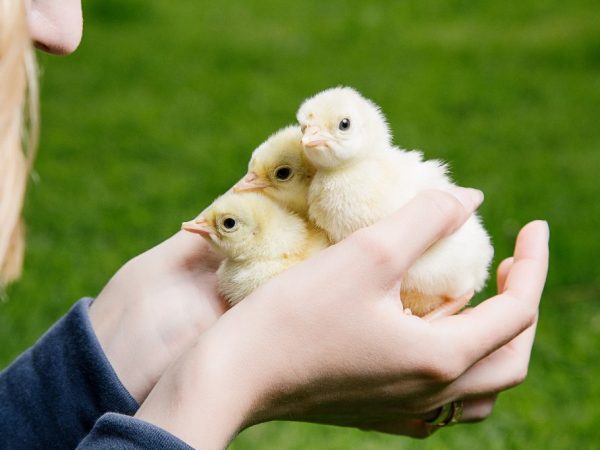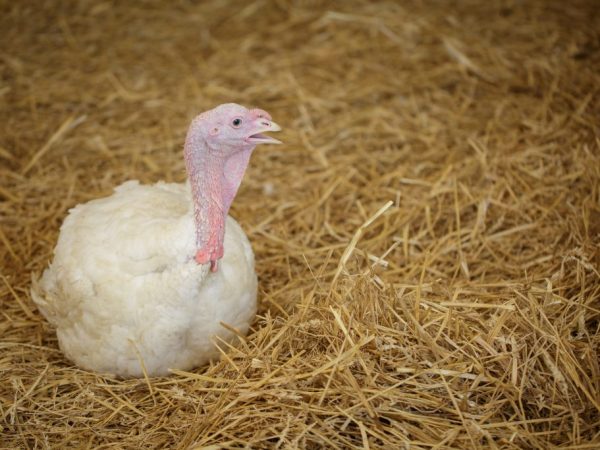Than when and how to solder turkey poults
Turkeys are very demanding on living conditions, and are also susceptible to many diseases. It is for this reason that it is recommended to use drugs that support their health and contribute to the normal development of the body. Breeders decide how to solder turkey poults based on the general condition of the birds, as well as the characteristics of the breed.

Features of soldering turkey poults
Why solder turkey poults
Even if the breeder adheres to all the necessary requirements regarding the diet and conditions of keeping the young, the death of the bird is possible. This is due to the fact that turkeys are prone to intestinal as well as infectious diseases... The herd population can be significantly reduced due to paratyphoid fever, pullorosis, infectious sinusitis or banal diarrhea. The bird begins to lag behind in growth or dies altogether. In such cases, the owners resort to drinking.
Soldering allows:
- increase the survival rate of chicks by 60-65%;
- grow quickly and gain weight;
- strengthen immunity;
- increase appetite;
- increase bird activity.
Features of drinking turkey poults
In order to avoid the death of turkeys, you must have a first-aid kit on hand for all occasions. But it's better to start with prevention.
Any drug should be given to the bird according to a clear scheme, especially with regard to antibiotics. Their non-systemic intake does not give any results, but only destroys the intestinal microflora, provoking constipation or diarrhea.
The scheme is purely individual for each breed of turkeys. It also depends on the health of the parents of the turkeys, the quality of the food, the amount of lighting and conditions of detention... On the basis of these factors, a specific scheme for feeding turkey poults is developed.
How and how to drink turkey poults
Young animals are injected with auxiliary preparations, starting from the first days of their life, even if the offspring look strong and healthy. Some farmers refuse medication, citing the fact that such an intervention negatively affects the quality of meat and eggs.
How to solder turkey poults in the first days of life depends on the breed and condition of the chicks. Birds need:
- Mineral and vitamin complexes. They contribute to the growth and strengthening of the immune system. Such preparations provide the growing body with all the necessary vitamins and minerals. Reception is started in the first days of life. The course is about a week. Vitamins of group B, which are part of the complexes, establish the process of assimilation of fats, proteins and carbohydrates, thereby contributing to the growth of muscle mass and skeleton. Vitamin D prevents rickets in young chicks. Vitamins A and E improve enzymatic and hormonal synthesis.
- Antibiotics prevent the development of pathogenic microflora. Taking these drugs in the first days of life reduces the risk of disease and epidemic among the turkey population. It is worth being careful with antibiotics and drinking turkey poults strictly according to a certain scheme, otherwise taking these drugs can cause dysbiosis.
- Immunomodulators help to strengthen the immune system and increase the body's resistance to infections. Taking these drugs allows you to grow a strong and healthy livestock of turkeys.
- Probiotics are used in combination with antibiotics to prevent the development of candidiasis and dysbiosis in young turkey poults. Also, these funds improve the functioning of the digestive system during the first month of life.
There is a specific schedule that must be followed in order to produce healthy young stock. Some breeders resort to taking antibiotics on the first day of their chicks' life, but this is wrong. The turkey is born with a sterile intestine, which within a few days is colonized with beneficial bacteria. They are directly involved in the digestion process, which is why their presence is so important for the body. Antibiotics tend to suppress not only pathogenic bacteria, but also those that are normally found in the intestines of the bird. For this reason, the optimal period to drink antibiotics for turkey poults is 3-5 days of life.
The main mortality among chicks is observed at 12-14 days, which means that by this time it is better to complete the first course of antibiotics and, if necessary, start the second. Also, regardless of the age and condition of the chicks, it is better to add potassium permanganate to the water in a small amount, so that the water becomes slightly pink. The drink is rich in color, it can burn the mucous membranes of the mouth and esophagus. In addition to potassium permanganate, during a cold snap or an outbreak of respiratory diseases among poultry, it is recommended to add a couple of drops of iodine to the water. For the same purpose, chicks can be drunk with iodinol.
Preventive preparations for drinking turkey poults

Taking medication correctly will save the livestock
In order to properly drink the chicks and get healthy offspring, you need to know what kind of drugs you need to give. The correct scheme of reception and its strict adherence will help the poultry farmer to keep the livestock.
Pharmazin is produced in the form of a white powder. It is mixed with water and the containers with the solution are placed in the shade, since the active substance decomposes in direct sunlight. Use 1 gram of powder per liter of water. The drug is given according to the scheme 1-3 days, 28-29 days, 57-58 days. It has a detrimental effect on streptococci, staphylococci, microplasmas and clostridia.
Baytril is a very effective drug for fighting bacteria as well as salmonella. The drug is produced in the form of a light yellow solution. The course of soldering young animals with the medicine is as follows: 3-5 days 0.5 milliliters per 1 liter of water, 17-18 days 0.5 milliliters per 1 liter of water, and on the 55th day already 1 milliliter per 1 liter of water.
Amprolium used to prevent coccidiosis, a dangerous disease for young turkeys. It spreads quickly and contributes to the death of the entire herd. The drug is available in the form of a white or slightly yellowish powder. It has a rather specific taste, thereby scaring the chicks away from the water, for this reason it is preferable to add it to the feed. Starting from the second week of life, add 3 grams of powder per 10 kilograms of feed for 7 days. The drug is added to the feed again from 43 to 49 days.
Levomecitin and tetracycline are antibiotics that can be purchased at your regular pharmacy. They are in no way inferior to specialized veterinary drugs, but they cost significantly less, which reduces the cost of raising poultry. 1 tablet is diluted in 1 liter of water. In order for the medicine to completely dissolve, it must be thoroughly grinded in a mortar. It is not recommended for them to drink turkey poults in the first days; drugs are administered in the period from 1 to 2 weeks.
Metronidazole a universal remedy for feeding young animals. It has been used since 21 days as a prophylaxis of histomonosis.This dangerous disease practically does not respond to treatment and leads to the death of most or even all of the livestock. The main method of combating histomonosis is its prevention. To do this, dissolve 0.5 grams of the drug in 1 liter of drink for turkey poults. The course is 9 days. On day 41, re-soldering of the birds begins.
Vetom is a probiotic that contributes to the preservation of intestinal microflora during the period of taking antibiotics. It also stimulates humoral and cellular immunity. It is introduced into the water in drinking bowls while the livestock is fed with antibiotics.
Chiktonik is a complex drug. It contains the daily intake of vitamins, trace elements and amino acids, thereby contributing to the correct development of turkey poults in the first 3-4 months of life. This vitamin complex also acts as an appetite stimulant and improves the condition of feathers.
Glucose is used to increase the vitality of the chicks in the early days. It costs a penny, but is actively used by breeders for feeding turkey poults.
Iodinol is an excellent remedy for enhancing the immune forces of the chicks' body. It is rarely given in its pure form, more often it is diluted with a few drops in a liter of boiled water or saline solution. Turkey poults are soldered with iodinol from the first day of their life.
How to solder turkey poults if they are sick
If timely prophylaxis of turkey poults was not carried out and the bird fell ill, urgent measures should be taken to eliminate the cause and symptoms. The first manifestation of most diseases in the first 2-3 months of chicks' life is diarrhea, and refusal of food. The turkey chick becomes lethargic, sleeping most of the time or sitting separately from the rest of the herd. There are several differences by which you can recognize a sick chick among its healthy counterparts. If you look closely, the difference becomes noticeable even to an inexperienced poultry farmer.
You need to pay attention to:
- Down, when it comes to day-old chicks, must be dry. A sticky or dull edge is a sign of soreness in the turkey.
- The abdomen should be tucked up, if the abdomen is too soft and swollen, then the chick suffers from digestive problems.
- The goiter in well-fed turkey poults swells slightly, but you can feel the dense food inside it. If the goiter is inflated, but there is no food in it, then such turkeys will not live long.
- The anal opening of healthy chicks is always clean and dry, but if the turkey is sick, then the feathers and down around the cloaca are stained with excrement.
- The presence of wounds indicates about cannibalism among the livestock. Pecking from turkeys suggests that the bird was kept in unsuitable conditions for it, and also had a nutritional deficiency in the diet.
- Tousled feathers and the presence of bald patches may indicate skin parasites - chewing lice.
A sick chick must be planted and given Iodinol to drink, this will help relieve intestinal inflammation. Then, within 3-5 days, it is soldered with Metronidazole, and Chicotnik in accordance with the instructions. Daily turkey poults are soldered in case of emergency with Beiril. The rest of the livestock also needs to be watered with these drugs, since most poultry diseases are contagious and are easily transmitted from one individual to another.


